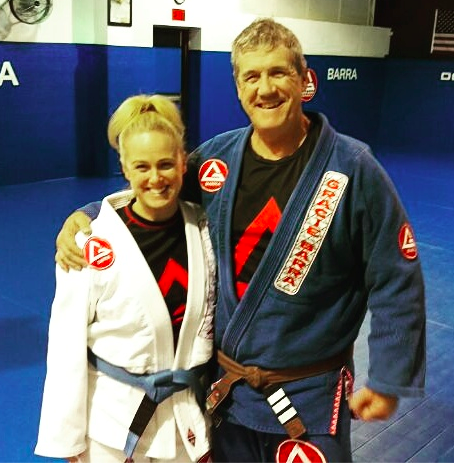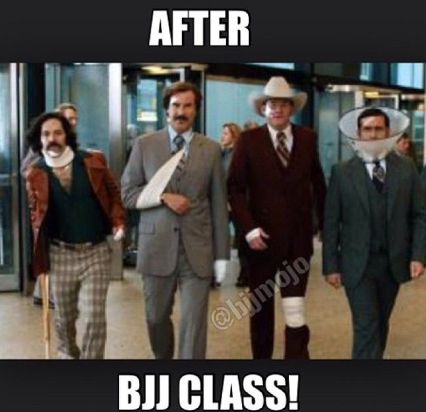The Writer’s Journey—Staying the Course From Newbie to Master
Some of you may or may not know that I practice Brazilian Jiu Jitsu. BJJ is unique in that there are only FOUR colored belts (blue, purple, brown, black) and new practitioners are a white belt for roughly a year an a half before they can test for blue. I just earned my blue belt last Thursday. This is no small feat, seeing as how I am the ONLY female in a dojo of males much larger and most far younger than I am.
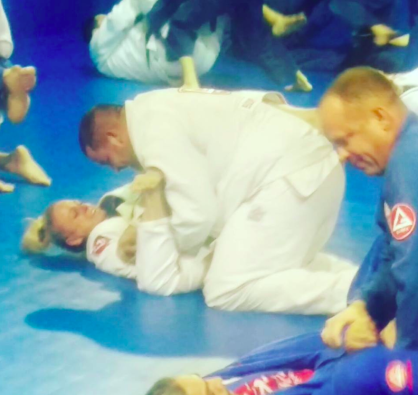
My first fight as a blue and SERIOUSLY? I get TYLER?
The parallels for BJJ and writing are profound though. In the beginning it really doesn’t seem all that difficult. Yeah, you just grab that leg, pull that knee, sure! Got it. Then? Once you get on the mats?
*head explodes*
The more you learn, the more you come to know how much you don’t know.
One would think I’d feel more skilled and capable with each class, but I don’t. Quite the opposite. As I peel back the layers and nuance? All I can see is how far I have to go.
Back to writing.
The mark of a pro is they make whatever we want to do look easy. From running a business to playing guitar to wicked cool Kung Fu moves, masters rarely seem to even break a sweat. Same with authors. With the pros? The story flows, pulls us in, and appears seamless and effortless.
As we take off for the holidays to rest and relax and ponder over what we’ve achieved in 2015, what we hope to still achieve in 2016, I want to close out the year with this elucidation regarding the process so that you have no surprises….
Many of us decided to become writers because we grew up loving books. Because good storytellers are masters of what they do, we can easily fall into a misguided notion that “writing is easy.” Granted there are a rare few exceptions, but most of us will go through three acts (stages) in this career if we stick it through.
Act One—The Neophyte
This is when we are brand new. We’ve never read a craft book and the words flow. We never run out of words to put on a page because we are like a kid banging away on a piano having fun and making up “music.” We aren’t held back or hindered by any structure or rules and we have amazing energy and passion.
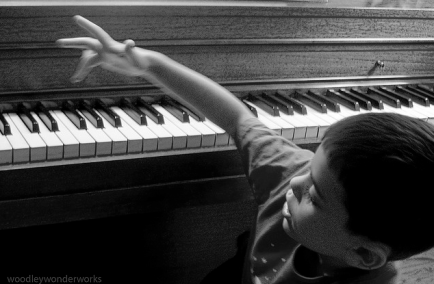
Woodleywonderworks Flikr Creative Commons
But then we go to our first critique and hear words like “POV” and “narrative structure.” We learn that maybe we don’t know as much as we think we do and that we need to do some training. We also finally understand why so many famous authors drank…a lot.
Act Two—The Apprentice
The Apprentice Phase comes next. This is where we might read craft books, take classes, go to conferences and listen to lectures. During the early parts of this phase, books likely will no longer be fun. Neither will movies. In fact, most of your family will likely ban you from “Movie Night.” Everything now becomes part of our training. We no longer look at stories the same way.
The apprentice phase is tough, and for many of us, it takes the all the fun out of writing. The apprentice phase is our Act II. It’s the looooongest, but filled with the most growth and change. It’s the span of suck before the breakthrough.
I’ve studied other forms of martial arts, but I am relatively new to Brazilian Jiu-Jitsu. Right now I am in the span of SUUUUUCK. When I started as a neophyte, I “seemed” to do better because I just muscled my way around on the ground and being naturally strong? It worked…against an equally green opponent.
But it also wore me out and gave me more than a fair share of injuries. I had to learn technique. Technique looks awesome when Professor does it. It looks easy on theYouTube videos.
When I do it? Eh…not pretty and NOT easy.
But I am improving. As a beginning white belt, the upper belts just instantly laid waste to me. They had me in a choke or an arm bar in less than a minute. I made all kinds of stupid and reckless mistakes. I worked too hard. I used up too much energy. I used muscle power instead of brain power.
I had to learn to relax and breathe, which is counterintuitive when a 260 pound guy is smashing you. I had to instead, learn to use my small size, my speed, and my crazy flexibility. I had to learn to THINK. Now? I’m not winning my rounds, but I rarely ever lose and I fight some pretty big opponents who far outclass me. And YES, it is frustrating. There are times I’ve had to walk off the mat so they can’t see me cry. But, I have to give myself permission to be learning.
Same in writing. This gig is tough. There is a good damn reason not everyone can do what WE DO.
Many new writers will shy away from craft books because they fear “rules” will ruin their creativity. Truth is? They will totally ruin your creativity, but only for a little while ;) . It isn’t permanent.
Eventually we realize that rules were made to be broken. BUT, the difference between the artist and the hack is that the artist knows the rules and thus HOW to break them and WHY and WHEN. We start to see rules as tools.
In fact, one thing we do in Brazilian Jiu Jitsu is we grapple blindfolded. The trick is to not get fixated visually, but to be able to flex and move in response to the opponent. THAT is how sensitive you want to become. Same in writing. We want to become so immersed that we can do this stuff blindfolded. We instinctively feel what needs to happen where without having to say “Oh, this is a scene, and this is a sequel.”
As we move through The Apprentice Phase and we train ourselves to execute all these moves together—POV, structure, conflict, tension, setting, description, dialogue, plot arc, character arc—it eventually becomes easier. In fact, a good sign we are at the latter part of the apprentice phase is when the rules become so ingrained we rarely think about them.
We just fight write.
We’ve read so much fiction, watched (and studied) so many movies, read so many craft books, heard so many lectures, and practiced so much writing that all the “rules” are now becoming instinct and, by feel, we are starting to know where and how to bend, break or ignore them.
Like anything, there is NO substitute for DOING. Watching Holly Holmes videos is a good idea for understanding ground-fighting, but it can’t take the place of mat time. Reading, taking classes, studying cannot replace writing crap until we don’t write crap.
At the end of the apprentice phase, writing is now starting to become fun again, much like it was in the beginning when we were banging away on the piano keyboard. Like the fighter who instinctively knows to arm bar an opponent without conscious thought, we now find more and more of the “right” words and timing without bursting brain cells.
The trick is sticking it through the apprentice phase long enough to engrain the fundamentals into the subconscious.
Master
This is where we all want to be. In fact, we all want this on Day One, but sadly, I believe this Day One Master is reserved for only a handful of literary savants. Mastery is when we return to that childlike beginning. We write with abandon and joy and, since the elements of fiction are now part of our DNA, our literary marrow, what we produce isn’t the off-key clanging of a neophyte, it’s actually a real story worth reading. Granted, it isn’t all kittens and rainbows. Masters have a lot of pressure to be perpetual geniuses.
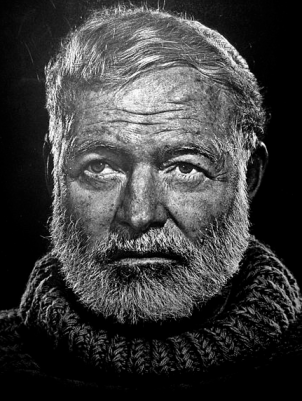
Portrait by Yosuf Karsh via Wikimedia Creative Commons
I believe most of us, if we stick to this long enough, will always be vacillating between the Advanced Apprentice Phase and the Mastery Phase. If we choose to try a totally new genre, we might even be back to Neophyte (though this will pass more quickly than the first time).
We have to to keep growing. The best writers still pick up craft books, refresh themselves in certain areas, read other authors they enjoy and admire to see if they can grow in some new area. Masters seek to always add new and fresh elements to the fiction.
The key to doing well in this business is to:
1. Embrace the Day of Small Beginnings—Starting is often the hardest part. Enjoy being new. Enjoy that feeling because you will reconnect with it later because you recognize it.
2. Understand We All Have an Apprentice Phase—We will all be Early, Intermediate, then Advanced Apprentices. How quickly we move through these will be dictated by dedication, hard work and, to a degree, natural talent.
3. No One Begins as a Master and Few Remain Permanent Masters—Every NYTBSA was once a newbie, too. When we understand this career has a process, it’s easier to lighten up and give ourselves permission to be imperfect, to not know everything. Many writers get discouraged and give up too soon because they don’t understand there is a process, and they believe they should be “Masters” right away.
Hey, I did.
We need to give ourselves permission to grow. If we love and respect our craft, we will always be learning, so we will continue to dip back into “Apprentice” to refine our art even further.
Does this make you feel better to know this career has a process? Are you in the Act II span of suck and getting weary? It is okay, REALLY! It’s natural. What are you doing to remain focused? Which part has you the most discouraged? Write with the abandon of the Neophyte then edit with the eyes of an Advanced Apprentice or Master ;) .
I love hearing from you!
Just as a warning, I may blog between now and the new year. I am working on this “resting” thing, but then I do miss y’all. Alex also has some more amazing posts but I am saving those for the new year. They are too good to miss. Make SURE you sign up for my upcoming classes!
Remember to check out the new classes listed at W.A.N.A International. Your friends and family can get you something you need for Christmas. Social Media for Writers, Blogging for Writers, and Branding for Authors.
Also, I have one craft class listed. Your Story in a Sentence—Crafting Your Log-Line. Our stories should be simple enough to tell someone what the book is about in ONE sentence. If we can’t do this, often there is a plot problem. This class is great for teaching you how to be master plotters and the first TEN SIGNUPS get their log-line shredded for free, so you will be agent ready for the coming year.
Enough of that…
I love hearing from you!
To prove it and show my love, for the month of DECEMBER, everyone who leaves a comment I will put your name in a hat. If you comment and link back to my blog on your blog, you get your name in the hat twice. What do you win? The unvarnished truth from yours truly. I will pick a winner once a month and it will be a critique of the first 20 pages of your novel, or your query letter, or your synopsis (5 pages or less).
For those who need help building a platform and keeping it SIMPLE, pick up a copy of my latest social media/branding book Rise of the Machines—Human Authors in a Digital World on AMAZON, iBooks, or Nook.



